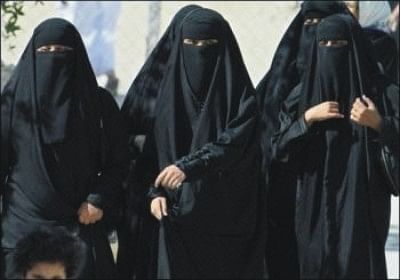<i>Purdah in Islam</i>

How much does a woman need to cover?. Photo: sheikyermami
The High Court Division's recent suo motu order directing the government to ensure that no woman is forced to wear burqa at the educational institutions and offices, and the subsequent circular of the Ministry of Education with a similar directive have brought forth yet again the religious dogmatism which often tends to violate the human rights of the women.
Instructions in the Holy Qur'an are that women should dress, move and look in a modest way. On the other hand, it has also been made mandatory in the Holy Book for men to conduct themselves in relation to women in a modest and gentle way, and not to look at or think of women in a lustful way.
Verse 30 in Surah An-Nur in the Holy Qur'an says: "Say to the believing men that they should lower their gaze and guard their modesty; that will make for greater purity for them; and Allah is well acquainted with all that they do."
Reasons for purdah seem very innocuous and pious. In fact, women in all religions and communities follow certain dress code for the purpose of modesty. Controversies and debates, however, are on the degrees and forms of covering the body and face to ensure acceptable modesty.
The issue actually boils down to interpretation of the Qur'anic verses on purdah. Of course, that interpretation is to be preferred which would ensure modesty as well as her dignity in a manner that smoothens rather than complicates her living, learning and working in the society. However, this has not been always the case.
Two verses have been especially dedicated to purdah in the Holy Qur'an. One says: "And say to the believing women that they should lower their gaze and guard their modesty; that they should not display their beauty and ornaments except what (must ordinarily) appear thereof; that they should draw their veils over their bosoms and not display their beauty except to their husbands, their fathers, their husbands' fathers, their sons, their brothers and brothers' sons, or their sisters' sons" … (Surah An-Nur, Verse 31).
The second one is: "O Prophet! Tell thy wives and daughters, and the believing women, that they should cast their outer garments over their persons (when abroad); that is most convenient, that they should be known (as such) and not molested. And Allah is Oft-Forgiving, Most Merciful" … (Surah Al-Ahzab, Verse 59).
The above two verses have been unfortunately interpreted by some sects in Islam as commands to cover the whole human face and, of course, the body, the practical manifestation of which we find everyday in many women in our society, who are clad in full burqa, in complete isolation and seclusion from the society.
But understood in their plain and simple meaning, the words and phrases used in the above verses can never mean using a veil to cover full face while covering the head and the bosoms, chest and neck.
Covering the full face marginalises women. It retards socialisation, education and normal transaction, seriously impeding their enlightenment. It is a sort of social imprisonment of women under which their potential for mental, intellectual, cultural and spiritual development can't be properly realised.
It cannot be that the Holy Qur'an and Sunnah, which place women in a very dignified position and historically have made great contributions towards protecting and promoting women's rights, would mandate the way the two verses have been interpreted by some traditionalists.
Just imagine a teacher taking his class. He would naturally like to see the impact of his presentation and teaching upon the students, and would also want to make sure the students are attentive. Imagine, in such a classroom, a burqa-clad female student covering the full face! Such problems are not infrequent in our country.
Wearing appropriate dress is, of course, a factor of modesty and good behaviour in the society, for which the above two verses have been revealed by Allah Almighty. In fact, there are many other norms and safeguards rightly prescribed in the Holy Qur'an and Sunnah, which seek to regulate social discipline to prevent natural attraction of men and women towards one another from developing into a negative factor for human welfare. Covering the full face can't be a factor of modesty.
Inappropriate interpretation of any verse can cause great damage to its true meaning and purpose. Allah Almighty has created man and woman in their majestic, attractive and delicate mutual interrelationships. These relationships are to be definitely regulated, controlled and steered by appropriate norms for the welfare of both, but keeping in full view that the Qur'an and Sunnah mandate equal position and status of man and woman.
It is indeed very heartening to note that Mahathir Muhammad, one of the most successful leaders of a Muslim country who sought to modernise Islamic thought and used enlightened Islamic ideas to develop Malaysia, had the following to say on purdah in his address at the International Forum on Islam in Kuala Lampur on July 19, 2002: "This belief is very dominant in Afghanistan that no part of women can be shown to any unknown male. Women there, therefore, don't agree to take off veil/burqa even if it is permitted. However, in most other Muslim countries, women's face and hands can remain without cover. Who has ruled such a dress code? Most fundamental and substantive rules of Islam have been systematically ignored and violated, while more importance is given to formalities and rituals."
In another address at the School of Oriental and African Studies in London on September 22, 2003, Mahathir said: "The problem is that Muslims tend to emphasise and venerate the form rather than the substance in the practice of everything."

 For all latest news, follow The Daily Star's Google News channel.
For all latest news, follow The Daily Star's Google News channel. 



Comments